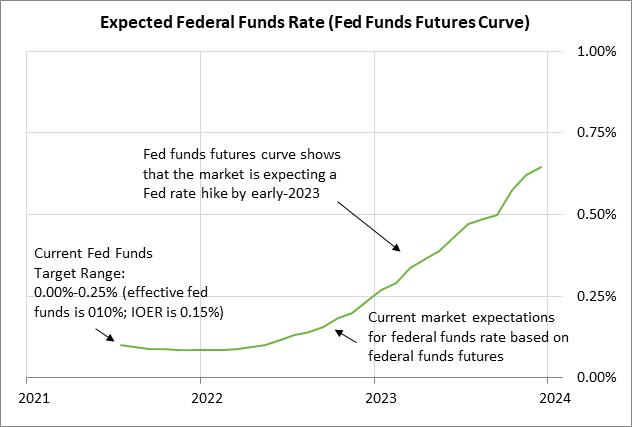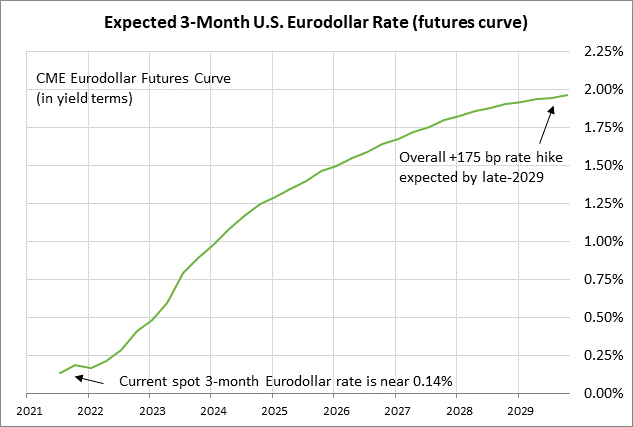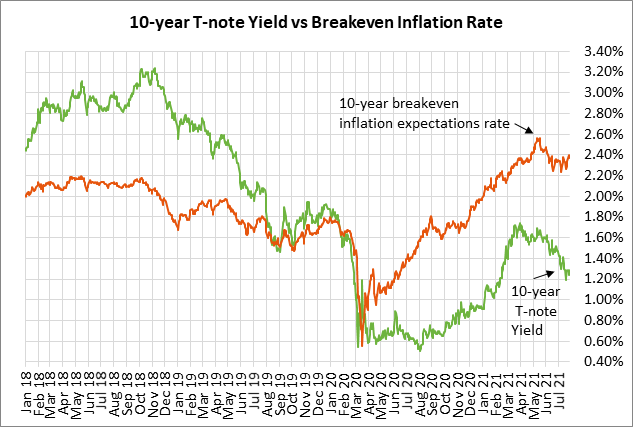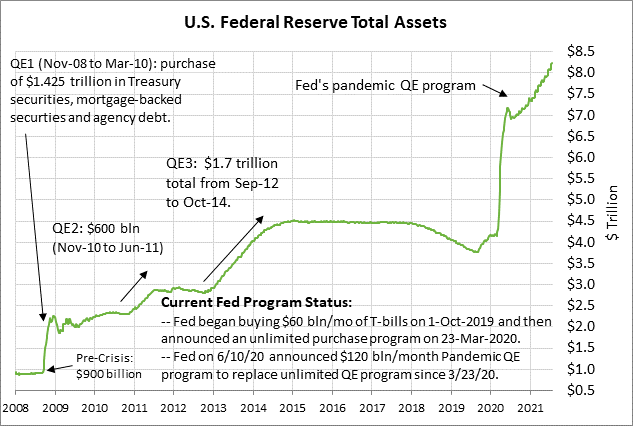- Fed Chair Powell today likely to try to keep markets calm
- Work continues on bipartisan infrastructure bill
Fed Chair Powell today likely to try to keep markets calm — The FOMC at its 2-day meeting that ends today is expected to continue the QE tapering discussion that began at its last meeting on June 15-16. However, the FOMC today is likely to stress that the conditions have not yet been met for QE tapering.
Fed Chair Powell, in his post-meeting press conference, is likely to continue his attempt to keep the markets calm and not rock the boat, particularly given the stock market’s concern about the Delta variant and the Chinese government’s regulatory crackdown on multiple industries.
The Delta variant presents a major risk for the Fed because there is no way to know at this point how bad the pandemic resurgence might get. The Delta variant has plenty of fertile ground to spread since 43% of the U.S. population hasn’t been vaccinated, and the Delta variant is causing a surprising number of break-through cases for people who have been fully vaccinated.
The 7-day average of new U.S. Covid infections rose to a 3-month high of 57,513 on Monday, which was more than five times the 6-month low of 11,351 posted just a month ago on June 23. The CDC yesterday boosted its mask recommendations, and more areas are starting to recommend masks and social distancing.
The new warnings are likely to dampen the enthusiasm of some people to travel, go out to restaurants, and attend public events, thus curbing the economy. The surge in hiring is also likely to slow as businesses turn more cautious. Until the infection level peaks and starts to fall significantly, the Fed and the markets will be on a heightened pandemic alert.
However, the markets are still expecting the economic recovery to continue and the Fed to announce the tapering of its QE program by year-end. A recent survey by Bloomberg taken on July 16-21 found that 74% of respondents expect the Fed to provide an early warning of QE tapering at its August Jackson Hole conference or at the next FOMC meeting on September 21-22.
The survey found that 36% of the respondents expect the Fed to formally announce its QE program somewhere between September and November, while the largest plurality of 47% expect that announcement in December.
Regarding the actual implementation date, a hefty 71% of respondents expect the tapering to begin in Q1-2022. The remaining respondents are roughly split about whether the tapering will be either before or after Q1.
Fed Chair Powell today is likely to reiterate his theme that the current inflation surge is transitory, although he is likely to admit that the surge may not ease significantly until next year. The Fed is noting that most of the strength in the recent inflation statistics has been in the areas of the economy that are exposed to reopening pressures.
Still, the current inflation statistics are alarming. The PCE deflator, which is the Fed’s preferred inflation measure, soared by +6.8% in May on a 3-month annualized basis, and the core deflator wasn’t far behind with an increase of +6.6%.
The markets in the past several weeks have significantly scaled back expectations for Fed tightening. The markets are not expecting the Fed’s first +25 bp rate hike until 2023, which is about 1-1/2 years away.
On a yield basis, the Dec 2023 federal funds futures contract in the past three weeks has eased by 15 bp to 0.65%, which means the market is discounting just 55 bp of tightening through the end of 2023 from the current effective federal funds rate of 0.10%.




Work continues on bipartisan infrastructure bill — The bipartisan group of Senators continues to haggle over the infrastructure bill and have yet to reach an agreement. The group met on Monday evening and continued to talk on Tuesday. President Biden met with Democratic Arizona Senator Sinema on Tuesday to discuss the state of the talks. Senator Romney on Tuesday insisted that a deal was almost done.
Time is running short for a deal. Senate Majority Leader Schumer said that it would be necessary to work through this coming weekend if there isn’t a deal by Friday. The Senate is planning to leave for recess next Friday (Aug 6) and will not return until after Labor Day.
By next Friday, Mr. Schumer intends to have the Senate approve the Democrat’s $3.5 trillion budget resolution. However, that bill cannot be finalized until it becomes clear whether there will be a bipartisan infrastructure bill. If not, then the infrastructure spending will be added to the budget resolution. The budget resolution will set the stage for the Democratic-only reconciliation bill that the Democrats plan to pass this autumn.
